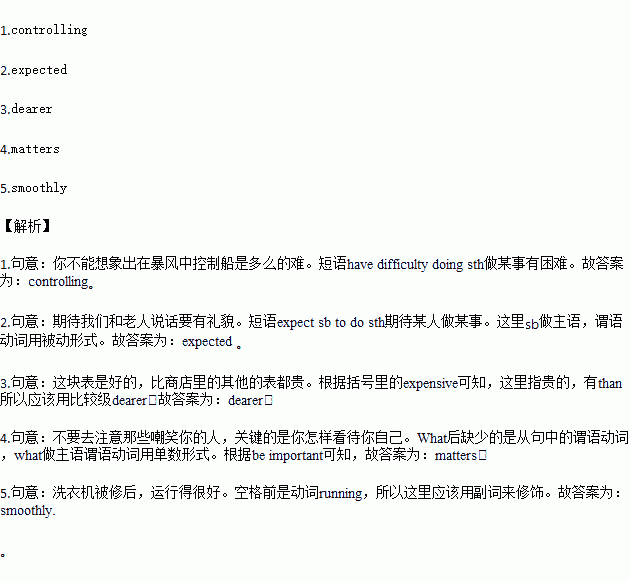题目内容
1.Your can never imagine how much difficulty they had __________(控制) the ship in the storm.
2.We are_________(期待) to speak to the old politely.
3.The match is nice and it is __________(expensive) than others in the shop.
4.Pay no attention to those who laugh at you. What ______ (be important) most is how you see yourself.
5.The washing machine was running __________ after it was repaired.
What do you do when you come across a problem while doing your homework? Andy would take out his smart phone, open a special app and searched the problem. Answers soon appeared on the screen.
Nowadays, many students do homework with the help of the Internet like Andy. They search for information online, use apps or discuss through social networks like QQ and WeChat.
“It’s convenient.” Andy said. “You also learn by seeing how others work them out.”
“It also improves students’ abilities.” said John, another student. He said it’s true for new types of homework.
John’s Chinese teacher often asks students to give speeches on great authors. When it comes to John’s turn, he usually searches online, picks out certain stories and makes PowerPoint presentations.
“I’ve become skilled at finding information online and using Microsoft Office,” Wang said.
However, many students think this trend (趋势) also brings up problems. Some students just copy the answers online without thinking. They become lazy.
A head teacher in Andy and John’s school said that knowing how to use the Internet is important. The key is to have good self-control.
“No matter how difficult the problem is, think about it independently (独立地) first,” the teacher said. “Be sure to understand the reasons behind the answers, or you won’t make progress. If you don’t have confidence about your self-control, ask your parents for help.”
Getting Help on Screen
The phenomenon (现象) | *Many students do homework with the 1. help. *They use apps or social networks. |
Two 2. | *When 3. a problem with homework, Andy would turn to his phone. *John usually searches for information and 4. certain stories and makes PowerPoint presentations when he is 5. to give a speech. |
Opinions from students | *Some think it convenient and can 6. students’ abilities. *Many think it makes students lazy when they just copy. |
Opinions from 7. | *8.good self-control is the key. *No progress will be made 9.students understand the reasons behind the answers. *If students aren’t 10.about their self-control, they should turn to parents for help. |

